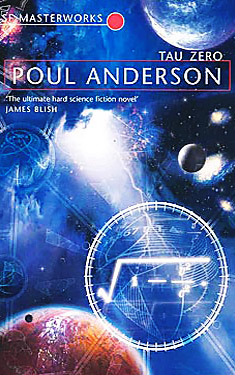Poul
Anderson
Completed 5/19/2019,
Reviewed 5/19/2019
3 stars
This book
was very hard science fiction. I understood
a lot of it, but I studied some physics and astronomy in college and enjoyed
relativity. I think Anderson did a
really good job of explaining the physics in lay terms, but it still might be
tough for some people. And that’s the
bright spot of this book, the physics.
The human interaction, on the other hand, is not Anderson’s forte, at
least not in this book. It’s soapy and
melodramatic. The basic plot is good,
but the subplots with the characters are lacking. It made it a bit of a slog to get through
because I never found myself caring for any of the characters.
 The Lenora Christine is a spaceship carrying
fifty people, half men half women, to a possible planet thirty-some-odd light
years away for colonization. If it turns
out to be not habitable, they’ll turn around and come back. The ship has a fusion engine and will approach
the speed of light, so much more time will pass on Earth than does on the
ship. Then things go to hell in a
handbasket when they pass through a nebula which knocks out their ability to decelerate. They can’t repair the spaceship without going
outside the ship, and doing so is immensely dangerous at the speeds they are
travelling. So, they must continue to accelerate
until they reach deep intergalactic space where there is almost no matter with
which they can accidently interact. But
because of time dilation, the universe around them is aging. Besides the technical aspect, the question
becomes whether the passengers aboard can cope with the thousands of years
passing by them on the outside while only a few pass within.
The Lenora Christine is a spaceship carrying
fifty people, half men half women, to a possible planet thirty-some-odd light
years away for colonization. If it turns
out to be not habitable, they’ll turn around and come back. The ship has a fusion engine and will approach
the speed of light, so much more time will pass on Earth than does on the
ship. Then things go to hell in a
handbasket when they pass through a nebula which knocks out their ability to decelerate. They can’t repair the spaceship without going
outside the ship, and doing so is immensely dangerous at the speeds they are
travelling. So, they must continue to accelerate
until they reach deep intergalactic space where there is almost no matter with
which they can accidently interact. But
because of time dilation, the universe around them is aging. Besides the technical aspect, the question
becomes whether the passengers aboard can cope with the thousands of years
passing by them on the outside while only a few pass within.
My biggest
problem with the book is the people.
They are very cardboard. The
characters do not feel very real and are not memorable. Most of the problems that happen to them are
interpersonal, which Anderson did not write very well. There’s a little bit about people not coping
well with the trials that afflict them on their journey, but I think these
scenes could have been fleshed out more.
And the relationships just reminded me of a soap opera, melodrama
without substance.
I also had to
do some willing suspension of disbelief regarding the science. As they approach the speed of light, they go
faster and faster, of course. But by definition,
the speed of light is the limit they can attain if they have no mass. They can’t go faster. That means they should be taking more than
thirty years to get to their initial destination, not five, which is described
in the book. And later, they continue to
accelerate and zip in and out of galaxies.
This is not possible unless they attain some sort of faster than light
travel, like the use of wormholes for space dilation. I had to put all this cognitive dissonance
aside and allow for the book’s conceit that approaching the speed of light gets
them around superfast.
But besides
this, the plot was well-conceived, that is, being stuck in space accelerating
toward the speed of light and the problems that unfold. The problems kept coming and the people had
to cope and figure out ways around it. I
give the book three stars out of five for the plot, but fail to give it anymore
because, well, it’s a soap opera aboard a lost ship.
No comments:
Post a Comment